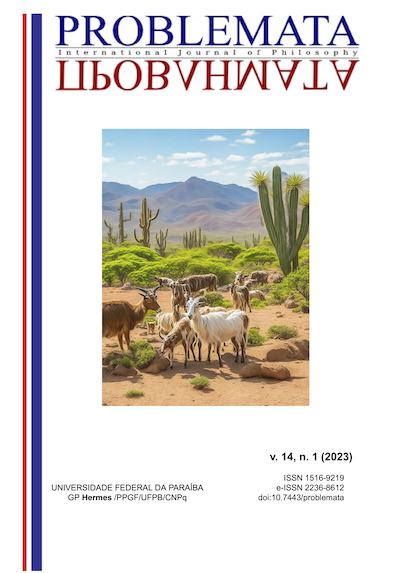ON THE COMPLEX RELATION BETWEEN KNOWLEDGE & EDUCATION
DOI:
https://doi.org/10.7443/problemata.v14i1.65001Keywords:
Ontology, Modernity, Language, Education, KnowledgeAbstract
The paper addresses the most general structures of knowledge, which Marques (1992) called ‘paradigms’. We start by highlighting that a paradigm of knowledge bears, in broad lines, a conception of education and of educative praxis, and that these can be translated into processes of teaching and of learning. On this ground, we then investigate [i] the old essentialist paradigm of the Being, in which education happens by means of transmission of immutable truths; [ii] the modern paradigm of the Reflection, which trusts the capacities of the individual reason and the instrumental control of nature; and [iii] the contemporary paradigm of the Language, which asks for the conditions of possibility of sentences intersubjectively valid in regard of the world and understands education as a conversation that constitutes men and produces worlds. In conclusion, we distinguish two senses of the term ‘knowledge’ and show how this distinction contributes to a better understanding of the complex relation between knowledge & education.
Downloads
References
ARISTÓTELES. De anima. Tradução de Carlos Humberto Gomes. Lisboa: Edições 70, 2001.
BACON, F. Novum organum ou verdadeiras indicações acerca da interpretação da natureza. Tradução e notas J. A. R. de Andrade. São Paulo: Abril Cultural, 1973. p. 07-237. (Coleção Os Pensadores).
BOUFLEUER, J. P. Um pouco da história do conhecimento e da razão humana. Revista Espaços da Escola, v. 4, n. 16, p. 53-59, 1995.
BURBULES, N.; RAYBECK, N. Philosophy of education: current trends. In: GUTHRIE, J. W. (Ed.) Encyclopedia of education. 2.ed. New York: Macmillan, 2012. p. 1880-1885.
CASAGRANDE, C. A. Educação, intersubjetividade e aprendizagem em Habermas. Ijuí: Unijuí, 200 .
CHATEUBRIAND, O. Semântica e ontologia. In: BRITO, A. N.; VALE, O. A. (Orgs.) Filosofia, lingüística, informática: aspectos da linguagem. Goiânia: Ed. da UFG, 1998, p. 11-34.
FÁVERO, A. Redescrição do mundo e educação. 2006. 214 f. Tese (Doutorado em Educação) – Programa de Pós-Graduação em Educação, Porto Alegre, UFRGS, 2006.
FENSTERSEIFER, P. E. A educação física na crise da modernidade. Ijuí: Editora Unijuí, 2001.
GADAMER, H.-G. Verdade e método I: traços fundamentais de uma hermenêutica filosófica. Tradução de Flávio Paulo Meurer. 7.ed. Petrópolis: Vozes, Bragança Paulista: Editora Universitária São Francisco, 2005.
GOERGEN, P. Pós-modernidade, ética e educação. 2.ed. Campinas: Autores Associados, 2005.
HABERMAS, J. O discurso filosófico da modernidade: doze lições. Tradução de Luiz Sérgio Repa e Rodinei Nascimento. São Paulo: Martins Fontes, 2000.
HABERMAS, J. Pensamento pós-metafísico: estudos filosóficos. 2.ed. Rio de Janeiro: Tempo Brasileiro, 2002.
HABERMAS, J. Verdade e justificação: ensaios filosóficos. Tradução de Milton Camargo Mota. São Paulo: Loyola, 2004.
HERMANN, N. Pensar arriscado: a relação entre filosofia e educação. Educação e Pesquisa, v. 41, n. 1, p. 217-228, 2015.
HORKHEIMER, M.; ADORNO, T. W. Dialética do esclarecimento: fragmentos filosóficos. Tradução de Guido de Almeida. Rio de Janeiro: Jorge Zahar Editor, 1985.
KUHN, T. S. A estrutura das revoluções científicas. 9.ed. São Paulo: Perspectiva, 2006.
MARCONDES, D. Filosofia, linguagem e comunicação. São Paulo: Cortez, 1992.
MARQUES, M. O. Aprendizagem na mediação social do aprendido e da docência. 2.ed. Ijuí: Editora Unijuí, 2000.
MARQUES, M. O. Conhecimento e modernidade em reconstrução. Ijuí: Editora Unijuí, 1993.
MARQUES, M. O. Os paradigmas da educação. Revista Brasileira de Estudos Pedagógicos, v. 73, n. 175, p. 547-565, 1992.
MEAD, G. H. Mind, self, and society: from the standpoint of a social behaviorist. Chicago: The University of Chicago Press, 1992.
MILOVIC, M. Modernidade. In: GONZÁLES, J.; FENSTERSEIFER, P. (Orgs.). Dicionário crítico de educação física. Ijuí: Editora Unijuí, 2005. p. 290-292.
OLIVEIRA, M. A. A filosofia na crise da modernidade. São Paulo: Loyola, 1989.
OLIVEIRA, M. A. Reviravolta liguístico-pragmática na filosofia contemporânea. 2.ed. São Paulo: Loyola, 2001.
PLATÃO. A república. 10.ed. Tradução de Maria Helena da Rocha Pereira. Lisboa: Calouste Gulbenkian, 2007.
PLATÃO. O banquete, Fédon, Sofista, Político. Tradução de José Cavalcante de Souza, Jorge Paleikat e João Cruz Costa. São Paulo: Abril Cultural, 1972. (Os Pensadores).
PRESTES, N. H. Educação e racionalidade: conexões e possibilidades de uma razão comunicativa na escola. Porto Alegre: EdiPUCRS, 1996.
RORTY, R. A filosofia e o espelho da natureza. 3.ed. Tradução de Antônio Trânsito. Rio de Janeiro: Relume-Dumará, 1994.
RORTY, R. Filosofía y futuro. Trad. Javier Calvo y Angela Ackermann. Barcelona: Gedisa, 2002.
RORTY, R. Objetivismo, relativismo e verdade. Tradução de Marco Antônio Casanova. 2.ed. Rio de Janeiro: Relume-Dumará, 1997.
SEVERINO, A. J. Filosofia da Educação: construindo a cidadania. São Paulo: FTD, 1994.
WITTGENSTEIN, L. Investigações filosóficas. 5.ed. Tradução de José Carlos Bruni. São Paulo: Nova Cultural, 1991.
ZILLES, U. O racional e o místico em Wittgenstein. Porto Alegre: EdiPUCRS, 1994.
Downloads
Published
Issue
Section
License
Copyright (c) 2023 César Fernando Meurer

This work is licensed under a Creative Commons Attribution 4.0 International License.
Authors who publish with this journal agree to the following terms:
- Authors retain copyright and grant the journal right of first publication with the work simultaneously licensed under a Creative Commons Attribution License that allows others to share the work with an acknowledgement of the work's authorship and initial publication in this journal.
- Authors are able to enter into separate, additional contractual arrangements for the non-exclusive distribution of the journal's published version of the work (e.g., post it to an institutional repository or publish it in a book), with an acknowledgement of its initial publication in this journal.
-
- Authors are permitted and encouraged to post their work online (e.g., in institutional repositories or on their website) prior to and during the submission process, as it can lead to productive exchanges, as well as earlier and greater citation of published work (See The Effect of Open Access).





